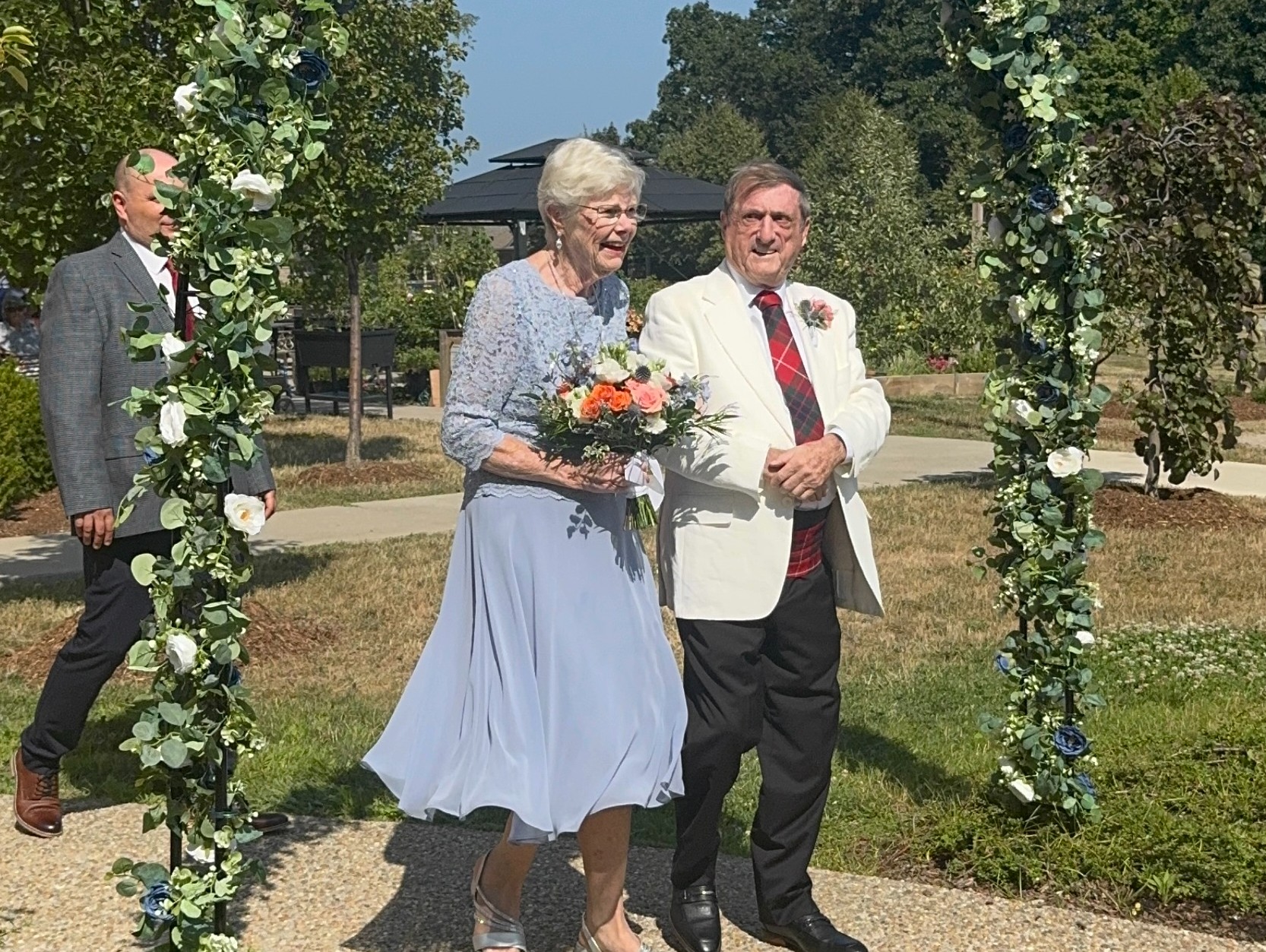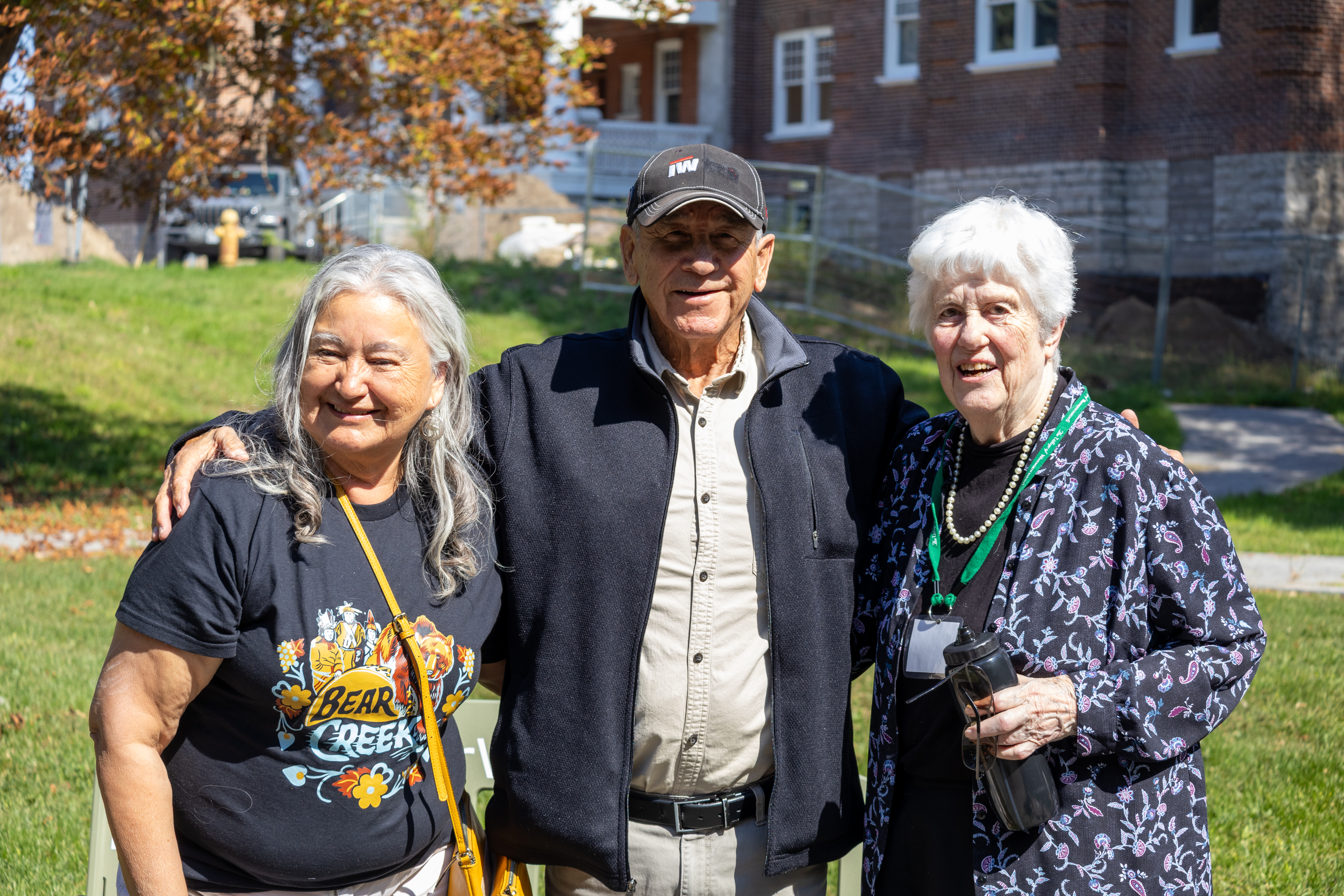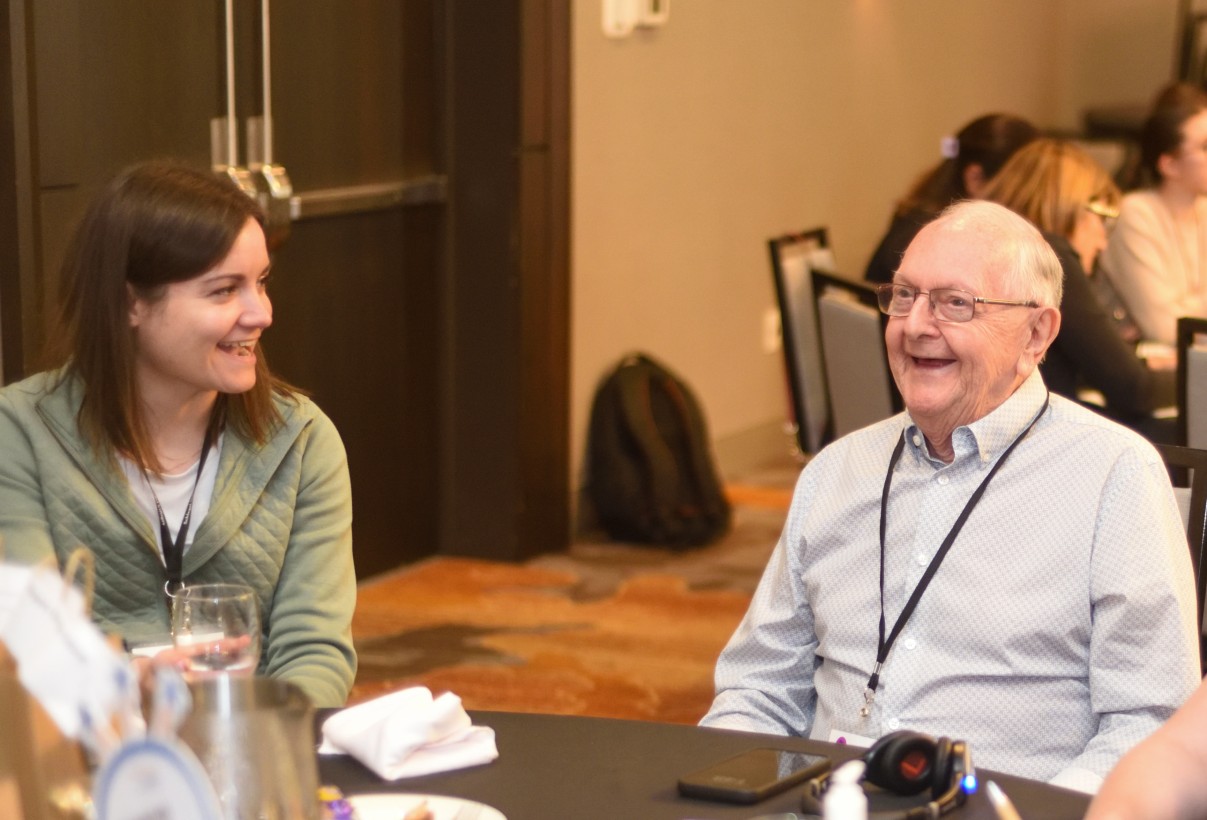Day 1
The Schlegel Villages leadership retreat is an annual tradition, where “we come together as one family to put deep, intentional focus on our growth and development,” says Christy Parsons, Vice President of People with Schlegel Villages as she opens to conference on the morning of April 2. “It’s a sacred time.”
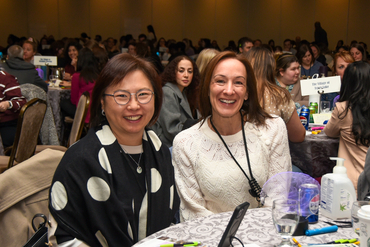 The group of 400 “Culture Keepers”, as Christy refers to the leaders from across the organization, stand and sing the Canadian National Anthem to open the day, in recognition of the proud heritage Schlegel Village enjoys as a family-owned, Canadian organization.
The group of 400 “Culture Keepers”, as Christy refers to the leaders from across the organization, stand and sing the Canadian National Anthem to open the day, in recognition of the proud heritage Schlegel Village enjoys as a family-owned, Canadian organization.
She then sets the stage for two days of learning, focused under the theme “A Coaching Mindset” and she reminds the room that a “keeper of the culture is a person who is charged with the responsibility for the perseveration of something valuable.
“Our family culture,” she says, “is certainly worthy of preservation.”
As Schlegel Villages founder Ron Schlegel comes into the room to take his seat in front of the stage, Christy mentions the roots of the family culture, going back to Ron’s parents, Wilfred and Emma. When Ron met and fell in love with a girl named Barb, the values of her parents, Max and Florence Becker, also helped shape the culture celebrated in the room this day.
Before she introduces the morning keynote speaker, she points out that the role of a leader is to “develop and grow the human spirit of those we are in service to.”
A coaching mindset is a growth mindset, she says, and “one of the most powerful tools we can use as a leader is coaching. It acts as a catalyst for unlocking potential, fostering growth, and driving success, not just for individuals but for teams and organizations.”
With that she welcomes Schlegel Villages Vice President of Finance, Scott Ballantyne, who is uniquely qualified to speak to the art of coaching as a highly successful baseball coach within the Ontario University Athletics circuit. He has supported some of Canada’s top university athletes to championships, and also been on the sidelines with youth teams as a parent and a coach.
Step up to the Plate: Keynote address in the morning of Day 1
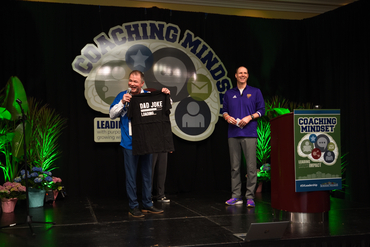 Scott focuses on five key areas of consideration: the impact of coaching on team culture; preparing our teams for success; coaching individuals versus coaching teams; a growth mindset and being ‘coachable’; and empowering the team.
Scott focuses on five key areas of consideration: the impact of coaching on team culture; preparing our teams for success; coaching individuals versus coaching teams; a growth mindset and being ‘coachable’; and empowering the team.
Through the next 45 minutes, Scott weaves in personal anecdotes from his time along baselines and in dugouts with connections to the strengths-based leadership culture Schlegel Villages embraces.
Some key thoughts from Scott’s session:
· Culture eats strategy for breakfast. It’s not that strategy isn’t important, but without culture, any team and any organization will struggle and have a difficult time progressing.
· He mentions the Buddhist concept of mudita, which is effectively the concept of finding joy and happiness in the success of others. He also points to a quote from former U.S. president Harry
Truman, who once said “it’s amazing what you can accomplish if you don’t care who gets the credit.”
· He poses the questions: “Can you be a leader and not be a coach and can you be a coach and not be a leader? “It’s hard to be effective at both,” he says. There’s a balance that must be struck.
· Practice doesn’t make perfection, he says, it makes permanent. Success comes from solid preparation, and coaches can help set the stage through the right preparation.
· Coaching individuals vs. coaching teams is about knowing each individual’s name, story, and their super power, to see how they fit within a diverse, varied and complementary team that maximizes the strength of each individual
· A growth mindset and being coachable means leaders need to confer and network with each other. Within Schlegel Villages, that means capitalizing on a network of leaders from 18 Villages.
· Empowering a team means asking questions, not simply offering answers. “Enlarging others makes you larger,” Scott says, and when you seek input, you enlarge others around you.
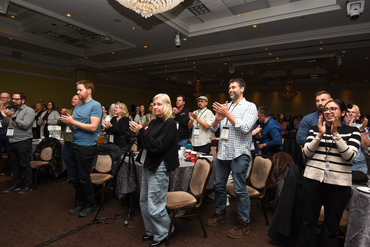 "My experience as a coach has really helped to shape me and how I lead my teams,” Scott says in conversation once his session is complete. “There are so many parallels between leadership in sport and leadership in business and I hope that our leaders can take some of the lessons I have learned through sport and apply them in their roles as Village leaders".
"My experience as a coach has really helped to shape me and how I lead my teams,” Scott says in conversation once his session is complete. “There are so many parallels between leadership in sport and leadership in business and I hope that our leaders can take some of the lessons I have learned through sport and apply them in their roles as Village leaders".
As Schlegel Villages grows into the future, it is the coaches in every Village that will help preserve the values and the family culture that helps make the organization a leader in the sector.
Day 2 in the realm of the coaching mindset
The second day of the leadership retreat features three key sessions for the larger group of more than 400 Culture Keepers gathered in the convention centre. They’re first taken through the minds and insights of direct care partners in a Success Award Winner panel discussion led by CEO Jamie Schlegel. They’re then invited to consider the parallels of a work environment and an improv stage, before they finish the day in the blue light of earth with the inspiring story of a poet and artist whose dreams of space flight became a reality in her early 50s.
In each session, along with the interwoven array of 30-minute breakout sessions or “Ideas in brief”, presented by internal experts from within Schlegel Villages both afternoons, the power and influence of a coaching, growth and learning mindset was at the core.
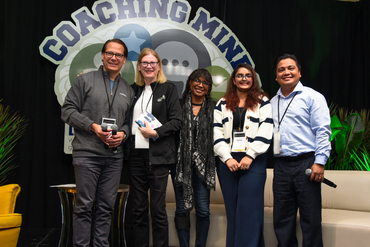 The Success Award Panel brought four caregivers together to offer advice on the components of successful leadership, and we’ll share more on this in a future Village Voice story.
The Success Award Panel brought four caregivers together to offer advice on the components of successful leadership, and we’ll share more on this in a future Village Voice story.
“Yes, and . . .”
As for the first keynote of Day 2, Andrea Flack-Wetherald is the founder of an organization called The Center for Brave Communication, which helps people within organizations learn to grow and accept change by building a true sense of trust among teams, not unlike the trust a team upon an improv stage must build in order to succeed at humour and entertainment.
In life or in business, people are facing pressure, just as an improv artist is on stage. At any given moment, things pivot and change and new challenges arise. It becomes easier to navigate such challenges when we create an environment where it’s safe for everyone to be bold and brave, knowing that someone has their back, so to speak.
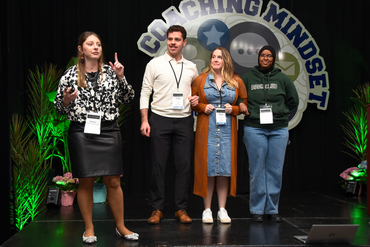 Andrea illustrates this with the Improv Game known as “Yes, and;” on the improv stage, players are commonly taught to always say, “Yes, and…” to continue any story created in the moment. Basically, they must agree with their partner’s idea, not matter how quirky, in order to keep the scene moving forward.
Andrea illustrates this with the Improv Game known as “Yes, and;” on the improv stage, players are commonly taught to always say, “Yes, and…” to continue any story created in the moment. Basically, they must agree with their partner’s idea, not matter how quirky, in order to keep the scene moving forward.
“Life,” Andrea says, “is an improv stage,” and there’s a place for yes, and. The yes, she says, is a balance of humility, acceptance and listening, where both players must be open to one another, knowing the next change or pivot can come from anywhere. The and means courage, vulnerability and contribution.
As she reflects on her time over two days with the Schlegel Villages Family, she says the ingredients for the trust building she speaks about are clear to see within the culture keepers she has met.
“My impression, that has been so touching, is the spirit of genuine and humble,” Andreas says, reflecting on her time at the conference. “Every person that I have met at this entire convention has absolutely embodied those ideas of being genuine and humble. It’s just a great group of people to be around.”
Space2inspire
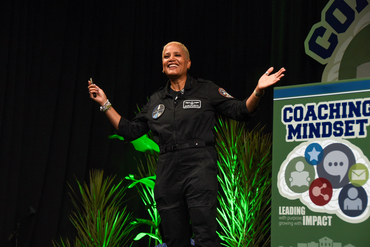 After two full days of discovery, the gathered leaders spend an hour with Dr. Sian Proctor, the first African-American woman to pilot a spacecraft. Dr. Proctor’s journey to outer space began as a child on the island of Guam, where her father was a behind-the-scenes support for NASA missions, including the Apollo 11 mission that saw Neil Armstrong and Buzz Aldrin become the first human beings to step foot upon the moon.
After two full days of discovery, the gathered leaders spend an hour with Dr. Sian Proctor, the first African-American woman to pilot a spacecraft. Dr. Proctor’s journey to outer space began as a child on the island of Guam, where her father was a behind-the-scenes support for NASA missions, including the Apollo 11 mission that saw Neil Armstrong and Buzz Aldrin become the first human beings to step foot upon the moon.
Education, she and her siblings were taught by her father and mother, is the key to fulfilling your dreams, and she always dreamed of going to space.
She studied and trained and spent decades envisioning her potential, but as time when by, her belief in herself began to falter, even as she had an opportunity in her late 30s to apply for a position as an astronaut.
She describes the process of applying and doubting herself, even though she technically met every qualification. She speaks of the imposter syndrome she battled within herself, even as she kept making it through the stages and eventually to the final 49 applicants out of thousands that had applied.
She was not accepted, however, but in the face of disappointment, she found opportunity and realized she could still support the space program by volunteering to live for months at a time in simulation environments that mimic on earth what we may one day have on the moon or even Mars.
It was January of 2020 when she emerged from her fourth such simulation, and she went from that space straight into the isolation of pandemic lockdown. This was the time, she says, she found her authentic voice as a poet and artist, which is the capacity in which she was chosen to be part of a four-person civilian crew that orbited earth for three days in 2021 on SpaceX's Inspiration4 mission.
Dr. Proctor’s story captivates the audience, and as she describes the awe-inspiring feeling of being bathed in the light of the earth, she reminds us of the possibility we hold for ourselves. She talks of the necessity of creativity and emphasizes the importance of creating a just, equitable, diverse, and inclusive (JEDI) environment where every person is able to pursue their dreams.
In her words, she encapsulates the power the culture keepers at Schlegel Villages have to create the world they want to see for the residents and teams that live and work within the Village environments.
